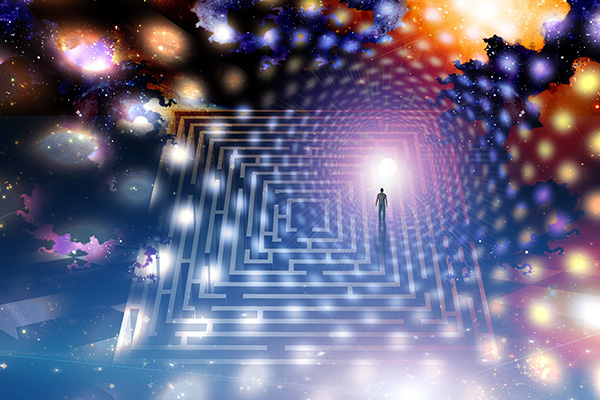trait
The Enigma Of Your Soul Contract
 Before we come into this lifetime, we design a soul contract. We choose a family that we want to be born to and we plan specific things that we want to accomplish, such as career, relationships, children, and so on. The contract is about our spiritual self and therefore also includes those things that we need to overcome and learn from.
Before we come into this lifetime, we design a soul contract. We choose a family that we want to be born to and we plan specific things that we want to accomplish, such as career, relationships, children, and so on. The contract is about our spiritual self and therefore also includes those things that we need to overcome and learn from.
Some of the more important things in your contract may come as a surprise, because often they are those things you do not want to do! This is usually a sure way of knowing that something is contractual. The things we prefer to do, or have done, we’ve already mastered, but the challenges and obstacles offer us opportunity to overcome our fears and anxieties, to step forward and learn more, to grow spiritually.
Some contracts are also much longer than others. Some of us remain here for a long time, while others do not. I doubt anyone knows for sure, but for the time that we are here, we must make every effort to learn and grow from every life experience.
This is also why some of us attract the wrong people, and constantly get into the wrong relationships? In these cases it is often your soul contract trying to teach you to speak up for yourself and claim your self-worth.
When old souls come in, usually nothing bothers them. They tend to take things with a grain of salt. However, when new souls come in, they are often very excited about so many things and can’t seem to get enough done.
There are also the creative souls, who are very talented, but also have a lot of emotional stress. Part of their contract is to learn to manage their stress better, so that they can be more open to their creative gifts. Continue reading
The Mystical Experiences Of Twin Siblings
 Twins have long fascinated scientists, spiritual practitioners, and the general public alike, not only because of their identical appearance, but also because of the extraordinary and often mystical experiences they share.
Twins have long fascinated scientists, spiritual practitioners, and the general public alike, not only because of their identical appearance, but also because of the extraordinary and often mystical experiences they share.
These shared experiences raise profound questions about the nature of our existence and the invisible forces that shape our lives.
Whether they grow up apart, but lead remarkably parallel lives, recall past-life connections, share intriguing astrological traits, or engage in telepathic and empathic communication, twins challenge the conventional view that our identities are shaped solely by genetics and environment. Their remarkable similarities suggest that something greater than nature and nurture influences their development and experiences.
The inexplicable bond between twin siblings suggests the presence of unseen influences – forces beyond the material world that govern our existence.
This bond manifests itself in stories of twins who, despite being separated at birth and raised in different environments, end up with strikingly similar tastes, career paths, and life choices. Such coincidences go beyond mere chance and suggest a deeper, more profound connection that transcends the physical realm.
Astrology also offers fascinating insights into the unique connections between twins. Born under the same celestial influences, twins often share similar personality traits and life patterns. Yet even subtle differences in their birth times can lead to slight variations in their astrological charts, adding another layer of complexity to their shared experiences. These astrological nuances can illuminate the dynamics between them and offer a deeper understanding of the forces at play.
How To Embrace Your Shadow Self
 Most people tend to shy away from acknowledging their dark or “shadow” side when it comes to spirituality.
Most people tend to shy away from acknowledging their dark or “shadow” side when it comes to spirituality.
In fact, the tendency to avoid the uncomfortable aspects of the self is due in large part to our religious or spiritual background. Throughout history, most traditions have encouraged people to suppress, deny, or transcend their human flaws and shortcomings in favor of higher ideals such as purity, salvation, or enlightenment.
This reluctance to face the shadow within continues to this day, with modern spiritual and metaphysical communities often favoring light, love, and positivity while largely ignoring the messy, difficult, and painful aspects of the human experience.
But by avoiding the shadow within, we deny ourselves the opportunity for a deeper understanding of our soul’s purpose and untapped possibilities for personal and spiritual growth.
According to Carl Jung, the famous Swiss psychiatrist who pioneered the concept of the “shadow” in psychology, “one is not enlightened by imagining figures of light, but by making the darkness conscious.” Enlightenment isn’t about avoiding the shadow. Instead, it’s about facing it and integrating it into our being.
When we face the shadow within, we reclaim parts of ourselves that hold immense power, creativity, and insight. By delving into the deeper truths of our shadow selves, we can unravel the unconscious patterns that dictate our lives, allowing for true healing, transformation, and enlightenment.
Finding Your Superpower Within
 Within you is a secret reservoir of untapped strength, a magical source of resilience, a mental and emotional fortitude waiting to be activated.
Within you is a secret reservoir of untapped strength, a magical source of resilience, a mental and emotional fortitude waiting to be activated.
This inner strength is not a fixed trait, but a dynamic force that can be cultivated and nurtured through conscious effort and self-awareness. We all have the superpower of a cosmic hero within.
Vulnerability
The path to uncovering our inner strength often begins with embracing vulnerability and acknowledging our imperfections and shortcomings.
It’s about recognizing that we are not infallible, but rather perfect spiritual beings in an imperfect human form, each with our unique blend of strengths, weaknesses, and karmic lessons to learn.
This willingness to be vulnerable allows us to shed the masks we wear and connect with our authentic selves, our soul identity, the core of our being where our true strength resides. It’s in this space of authenticity that we can begin to identify and cultivate the qualities that empower us to meet life’s challenges, face our karmic debts, and pursue our soul plan aspirations.
Increase Your Power And Influence With Charisma
 Charisma is a skill that can have a profound impact on our personal and professional lives. It is often wrongly assumed that charisma is a personality trait or talent that some people are born with. The truth is charisma is a learned behavior and skill that can be developed by anyone.
Charisma is a skill that can have a profound impact on our personal and professional lives. It is often wrongly assumed that charisma is a personality trait or talent that some people are born with. The truth is charisma is a learned behavior and skill that can be developed by anyone.
Charisma is the magnetic ability to attract, charm, and persuade others with our words and actions. The term originates from the Greek khárisma, which means ‘favor freely given,’ or ‘gift of grace,’ because the ancients believed that possessing this quality was a divine gift bestowed only upon those who were favored by the gods.
It is generally associated with people who are confident, engaging, and influential. By cultivating charisma, we become more effective at reaching and connecting with others, which can be invaluable in life.
Whether we are seeking to build stronger, healthier personal relationships, foster better professional connections, or make more friends, having a strong presence and the ability to engage with others is a key factor for success. Charisma is not about being arrogant, manipulative, or insincere. Rather it is about being authentic and genuine, while also being able to express ourselves in a way that resonates with others.
Charismatic people are skilled communicators who are able to listen actively, empathize with others, and express themselves clearly and persuasively. They are also able to project confidence, enthusiasm, and positivity, which can be infectious and uplifting to those around them.
How To Avoid Empath Ego-Traps
 Being an empowered empath is a wonderful gift and blessing. But the empath ‘label’ can also become problematic when it is misconceived by some as meaning more than it truly signifies.
Being an empowered empath is a wonderful gift and blessing. But the empath ‘label’ can also become problematic when it is misconceived by some as meaning more than it truly signifies.
There are very common ego-traps that some empaths and highly sensitive people get hung up on with regards their empathic experiences. These ego-traps can be very counterproductive, as it may actually be holding them back from meaningful personal growth and progressing our spiritual path.
These ego traps are easy to get wrapped up in, but they are not a sign of weakness or failure. The experience of being an empath is often intense and confusing. These ego-traps offer lessons for us that often go hand-in-hand with life as an empath.
Some of the typical empath ego-traps are as follows:
Empaths Always Know Best
Assuming we are always right about how we ‘read’ a situation or person, or needing to save everyone and be everybody’s ‘therapist.’ We may have a good read that something is amiss, or that someone is upset, but its unwise to assume we always know exactly why.
Often empaths will feel something from someone and decide for themselves why that person is feeling that way. This is a good way to create conflict and tension in relationships! Instead of assuming, rather ask.
And if the person doesn’t want to talk about it, try assuming it is not about you, and that maybe you have no idea what is really upsetting them. Start there. Give the person space and do not make it about you. Continue reading
Being An Empath Is No Excuse
 There’s nothing wrong with identifying as an empath. Actually, it can be beneficial to step into this truth for oneself, and own your empathic experiences as a significant aspect of your life.
There’s nothing wrong with identifying as an empath. Actually, it can be beneficial to step into this truth for oneself, and own your empathic experiences as a significant aspect of your life.
But for many people it is difficult to take on this ‘label,’ because they don’t feel worthy or they feel they are saying, “I’m more special than other people.” In these cases, there is great benefit in coming to terms with being an empath because it doesn’t have to mean either of those things.
Being an empath is not something they have to be worthy of – it’s a trait they either have or don’t have. And it’s not a matter of being better or ‘more special’ than anyone else – that notion comes from a fear of being judged.
Being an empath means being highly sensitive to emotional energies, and feeling those emotions in your own body as if they were your own. The term ‘empath’ is just a word we can use to describe this trait.
There is some scientific evidence for the empath experience. Studies* show we all have a very specific group of cells in our brain responsible for empathy and compassion, called the Mirror Neuron System. In the brain of highly empathic people, it is thought this group of cells may be hyperactive or hypersensitive.
Being an empath is a wonderful blessing and gift, instead of it being a ‘curse,’ weakness or disability. However, it is important for the empath to become empowered and own their sensitivity.
In order to accomplish this, it is vital for the empath to avoid adopting a ‘victim mentality’ or constantly blaming everything negative that happened in their life on the fact that they are an empath.
Some empaths erroneously believe many of the struggles they encounter can’t be overcome. They assume that they will always be crippled in some way by their experience as an empath. This is false. They may have specific experiences and lessons because they’re an empath, but these are opportunities for growth. Some of the ways this manifests are: